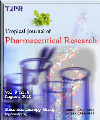
|
Tropical Journal of Pharmaceutical Research
Pharmacotherapy Group, Faculty of Pharmacy, University of Benin, Benin City, Nigeria
ISSN: 1596-5996
EISSN: 1596-5996
Vol. 13, No. 11, 2014, pp. 1809-1813
|
 Bioline Code: pr14249
Bioline Code: pr14249
Full paper language: English
Document type: Research Article
Document available free of charge
|
|
|
Tropical Journal of Pharmaceutical Research, Vol. 13, No. 11, 2014, pp. 1809-1813
| en |
Effect of Ketoprofen on Immune Cells in Mice
Hamdani, Dawood Ahmad; Javeed, Aqeel; Ashraf, Muhammad; Nazir, Jawad & Ghafoor, Aamir
Abstract
Purpose: To study the immunosuppressant and immunopotentiating effects of ketoprofen on antibody producing
cells.
Methods: Mice were given ketoprofen at doses of 1 mg/kg/day and 5 mg/kg/day for seven days.
Similarly polyinosinic–polycytidylic acid (Poly IC) and phosphate buffer saline (PBS) were used as
positive and negative control, respectively, for seven days. After seven days, the mice were sacrificed
and their spleens removed. Simultaneously, blood was withdrawn from the hearts of the mice and
serum was separated from the blood. The spleen cells were analyzed by enzyme-linked immunospot
(ELISPOT) while the serum was investigated by enzyme-linked immunosorbant (ELISA) to evaluate the
effects of ketoprofen on the ability of individual cell to produce antibodies and antibody- mediated
immune responses.
Results: Ketoprofen significantly (p < 0.001) reduced the ability of individual cells to produce antibodies.
There was a significant difference (p < 0.001) in % of spot forming cells of PBS treated negative control
group (0.045 %) as against positive control (0.058 %), 1 mg ketoprofen /kg/day (0.037 %) and 5 mg
ketoprofen/kg/day (0.032 %) treated groups. The results of ELISA showed a significant (p < 0.005)
difference in the absorbance values between negative control, positive control, ELISA control and
ketoprofen treated groups. Absorbance was significantly (p < 0.005) reduced in ketoprofen-treated
groups.
Conclusion: The ability of an individual cell to produce antibodies and antibody-mediated immune
responses is suppressed by ketoprofen, suggesting that it is immunosuppressive, and thus indicating its
potential application in patients with auto-immune disorders.
Keywords
Ketoprofen; Immunomodulatory; Immunosupressive; Antibody; Spot-forming cells; Polyinosinic–polycytidylic acid
|
| |
© Copyright 2014 - Tropical Journal of Pharmaceutical Research
Alternative site location: http://www.tjpr.org
|
|
